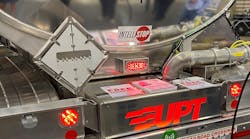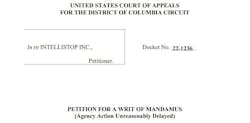Intellistop President Michelle Hanby has waited more than 560 days—three times longer than the federally mandated 180-day window—for the Federal Motor Carrier Safety Administration (FMCSA) to rule on her company’s highway-regulation exemption request for a safety device that helps reduce rear-end collisions.
Hanby’s hoping she won’t have to wait much longer.
Intellistop on Sept. 7 filed a petition for a “writ of mandamus” with the U.S. Court of Appeals for the District of Columbia, asking the court to “direct FMCSA to fulfill its statutory duty and promptly decide” on its request, which was made in December 2020 and published in the Federal Register in June 2021.
“I absolutely didn’t want to be in this position,” Hanby told Bulk Transporter, a sister publication of FleetOwner.
“But I didn’t have another option, because everything else I’ve tried for the last two years hasn’t gotten me anywhere.”
The petition, citing an “unreasonably delayed” agency action, was prepared by the Wiley Rein law firm in Washington, D.C., and lead counsel Stephen Obermeier, and served to named respondents, U.S. Transportation Secretary Pete Buttigieg; John Putnam, the U.S. Department of Transportation's general counsel; Robin Hutcheson, FMCSA’s deputy administrator; and Attorney General Merrick Garland.
The document further asserts FMCSA’s inaction constitutes a “constructive denial” that is “arbitrary, capricious, an abuse of discretion, [and] otherwise not in accordance with law,” and seeks relief by the court directing the agency to issue a “reasoned decision” within 30 days, compelling the agency to grant the exemption if a decision isn’t rendered within 30 days—or taking the unusual step of granting the exemption itself.
“Because there are no reasonable grounds on which the agency could deny the application, common sense counsels against prolonging this dispute by requiring an utterly pointless proceeding on remand,” Obermeier argues in the petition. “Although this court does not typically compel specific decisions on mandamus, to the extent necessary, this court should construe this filing as a petition for review and set aside the constructive denial.
“Here—where the overwhelming evidence has already led FMCSA to grant four exemptions—that result is warranted.”
‘Pulsating’ brake lamps
Intellistop manufactures a device that “pulses” the existing brake, clearance, and I.D. lamps on commercial motor vehicles, which are federally mandated to have “steady-burning” brake lamps. In its exemption request, Intellistop argued its device satisfies the criteria in Section 393.25(e) of FMCSA’s regulations because pulsing lights never turn off—they only dim and brighten—and the National Highway Traffic Safety Administration’s own research indicates pulsing brake lights may reduce the frequency of rear-end accidents. It also pointed to similar exemptions granted to National Tank Truck Carriers and Grote Industries.
Intellistop president Michelle HanbyJason McDaniel | Bulk TransporterBulk Transporterfirst reported on the long-delayed exemption requestin March after an email from Jack Van Steenburg, FMCSA’s executive director and chief safety officer, suggested the delay is related to Intellistop’s inclusion of both customer motor carriers and commercial vehicle manufacturers in its application. According to the email, FMCSA may not have the authority to grant an exemption to a manufacturer on behalf of carriers who “choose” to use Intellistop’s product to reduce costly rear-end crashes.
That’s because, while FMCSA regulates the “in-use” operation of commercial vehicles over 10,000 pounds in interstate commerce, NHTSA oversees the safety of newly manufactured vehicles, equipment, and technology, as covered by a Federal Motor Vehicle Safety Standard (FMVSS)—and the agencies apparently aren’t on the same page, though they share the same safety mission.
‘Interagency turf war’
The petition cites the reporting of Bulk Transporter and points to “friction” between FMCSA and NHTSA that may be delaying FMCSA’s decision. “But an interagency squabble cannot justify delay,” the petition contends. “And ‘[m]andamus relief’ can end an interagency turf war.
“In any event, squabbles between FMCSA and NHTSA are nothing new and would not justify delaying only Intellistop’s application. Indeed, the most recent exemption was granted despite this same concern having been raised [in the] Waste Management exemption … and such concerns pale in comparison to the safety interests at stake.
“Thus, there is no valid justification for the agency’s unprecedented delay in Intellistop’s exemption application.”
FMCSA said it “cannot comment on the litigation” in a Sept. 9 response to Bulk Transporter. The agency stated Feb. 17 that “DOT has the exemption request under active review, and should have a decision out shortly. The Intellistop inquiry touches on both FMCSA’s and NHTSA’s authorities, however we cannot comment further at this time.”
The 33-page petition and accompanying exhibits also mention the negative impact FMCSA’s “unreasonable” delay has had on Intellistop’s business, with several potential customers indicating it must have an exemption in place for them to move forward.
“As FMCSA continues to sit on Intellistop’s request far beyond what the statute allows, some [large trucking] fleet operators have told Intellistop that they cannot afford to wait any longer and must instead deploy already exempted [but inferior] products from Intellistop’s competitors,” the petition states. “And with each day that drags on with no action from FMCSA, other fleet operators are losing patience and may soon follow, harming public safety and a woman-owned small business.”
This article originally appeared in Bulk Transporter, FleetOwner's sister publication.






